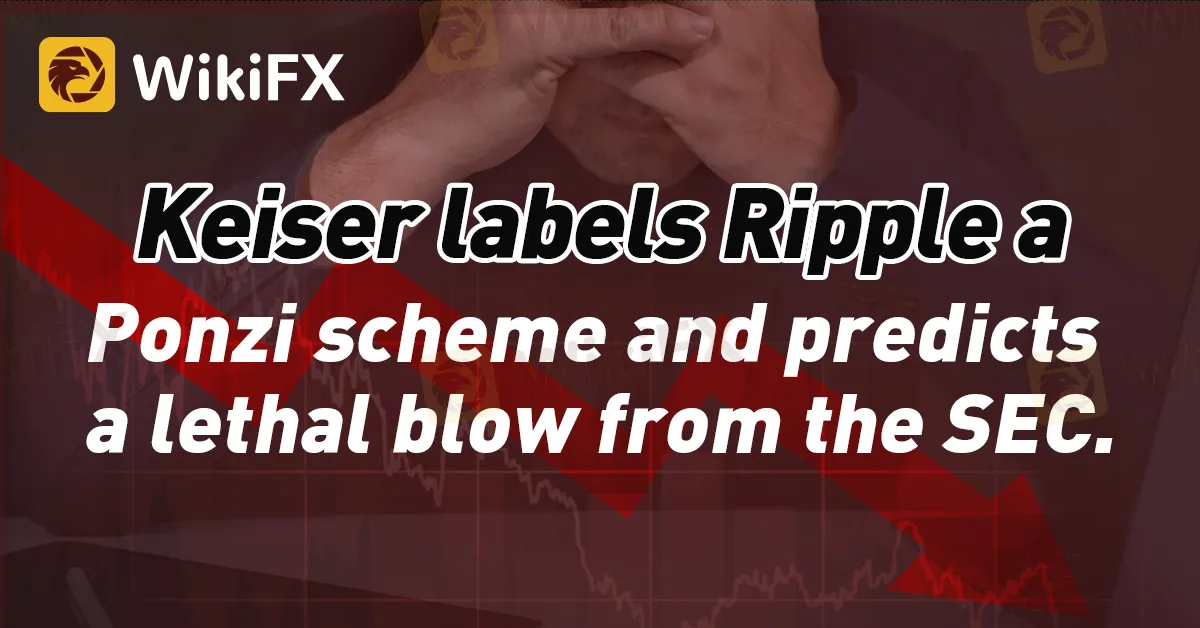简体中文
繁體中文
English
Pусский
日本語
ภาษาไทย
Tiếng Việt
Bahasa Indonesia
Español
हिन्दी
Filippiiniläinen
Français
Deutsch
Português
Türkçe
한국어
العربية
Max Keiser labels Ripple a Ponzi scheme and predicts a lethal blow from the SEC.
Abstract:Prominent Bitcoin proponent and renowned permabull, Max Keiser, has once again taken to Twitter to openly bash Ripple, its CEO Brad Garlinghouse, and the future of XRP.

Details
In the ever-evolving world of cryptocurrencies, Ripple and its native token XRP have attracted both support and criticism from various quarters. Prominent Bitcoin proponent and renowned permabull, Max Keiser, has once again taken to Twitter to openly bash Ripple, its CEO Brad Garlinghouse, and the future of XRP. Keiser, who serves as El Salvador's President Bitcoin advisor, has expressed his concerns about the regulatory landscape and the potential fate of XRP. At the same time, it is important to note that Keiser's remarks highlight the ongoing regulatory scrutiny faced by the cryptocurrency market.


Max Keiser's Stance
Max Keiser, a prominent Bitcoin proponent has once again expressed his convictions about the potential downfall of Ripple and its native cryptocurrency, XRP, despite acknowledging the US Securities and Exchange Commission's (SEC) tendency to overreach its authority. Keiser's unwavering confidence in Bitcoin's resilience shines through his tweet, where he states, “Of course, the SEC is 'overreaching,' but that won't stop them from killing off XRP and every other shitcoin. (Except BTC, of course. It's untouchable).” His remarks highlight his belief that Bitcoin is the exception amidst regulatory scrutiny.
In addition to his criticism of Ripple, Keiser aimed at Wall Street and the finance industry, suggesting that individuals with money and influence often operate without being bound by the same rule of law as others. He accused Ripple CEO Brad Garlinghouse of spending significant amounts to sustain what he deemed a “Ponzi scheme.” However, Keiser emphasized that even Garlinghouse would be unable to outspend the combined forces of the federal government and financial heavyweight Jamie Dimon.
Keiser's perspective indicates that he believes XRP will inevitably face a severe setback in the future. His tweet concludes with an ominous assertion, stating, “It's just a matter of when, not if, when XRP gets cut down.” This statement reflects Keiser's conviction in the inevitability of XRP's demise, seemingly predicting a bleak future for Ripple's cryptocurrency.

Keiser's Role
In addition to being a well-known Bitcoin advocate, Max Keiser also holds the position of Bitcoin advisor to El Salvador's President. However, it is crucial to emphasize that his opinions are personal and do not necessarily represent the views of the wider cryptocurrency community or the official stance of the El Salvadoran government. Keiser's influential position, combined with his outspoken criticism of Ripple, adds an interesting perspective to the ongoing debates surrounding the future of XRP.
Increasing Regulatory Scrutiny
Keiser's remarks coincide with a period of heightened regulatory scrutiny in the cryptocurrency market worldwide. Governments and regulatory bodies are grappling with the task of developing frameworks to govern digital currencies effectively. Ripple, as a prominent player in the cryptocurrency space, has faced regulatory challenges with the SEC, which has accused the company of conducting an unregistered securities offering through the sale of XRP. The outcome of this legal battle will undoubtedly have significant implications for Ripple and the future of XRP. Regulatory decisions regarding XRP could set precedents for how other cryptocurrencies will be treated in the future. Max Keiser's criticism reflects the prevailing uncertainty.
Conclusion
Max Keiser's recent Twitter criticism of Ripple and his doubts about the future of XRP has reignited discussions about the regulatory challenges faced by cryptocurrencies. While his opinions are personal and do not represent the wider cryptocurrency community or the El Salvadoran government, they shed light on the concerns surrounding XRP. As the legal battle between Ripple and the SEC unfolds, the fate of XRP hangs in the balance, with potential implications for the wider cryptocurrency market. It remains to be seen how regulators will navigate the complex landscape and how this will shape the future of cryptocurrencies like XRP.

Disclaimer:
The views in this article only represent the author's personal views, and do not constitute investment advice on this platform. This platform does not guarantee the accuracy, completeness and timeliness of the information in the article, and will not be liable for any loss caused by the use of or reliance on the information in the article.
Read more

The Impact of Interest Rate Decisions on the Forex Market
Interest rate changes determine currency attractiveness, influencing capital flows and exchange rate trends. Understanding this mechanism helps investors navigate the forex market effectively.

How a Housewife Lost RM288,235 in a Facebook Investment Scam
A 47-year-old housewife in Malaysia recently fell victim to an online investment scam, losing a substantial sum of RM288,235 after engaging with a fraudulent scheme advertised on Facebook.

Interactive Brokers Launches Forecast Contracts in Canada for Market Predictions
Interactive Brokers introduces Forecast Contracts in Canada, enabling investors to trade on economic, political, and climate outcomes. Manage risk with ease.

Bank Negara Malaysia Flags 12 New Companies for Unauthorised Activity
Bank Negara Malaysia (BNM) has updated its Financial Consumer Alert List (FCA List) by adding 12 more entities, reinforcing its efforts to warn the public against unregulated financial schemes. Check if your broker made the list!
WikiFX Broker
Latest News
The Withdrawal Trap: How Scam Brokers Lure Victims into Paying More
FCA to Investors: Think Twice Before Trusting These Brokers
Trump\s tariffs: How could they affect the UK and your money
Trump gambles it all on global tariffs he\s wanted for decades
TradingView Brings Live Market Charts to Telegram Users with New Mini App
Trump tariffs: How will India navigate a world on the brink of a trade war?
Interactive Brokers Launches Forecast Contracts in Canada for Market Predictions
Authorities Alert: MAS Impersonation Scam Hits Singapore
IG Group Acquires Freetrade for £160M to Expand UK Investment Market
U.S. March ISM Manufacturing PMI Released
Currency Calculator







